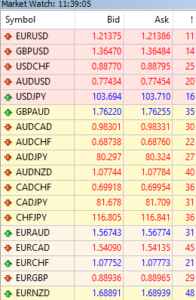Starting forex trading has never been easier. Now there are more and more top forex brokers offering great deals, powerful educational infrastructures, and more to attract your business. This is great for you as a potential forex trader, so long as you know some key points about trading forex.
One of these key points that you will encounter right away and that can be the cause of confusion for many, is the spread in forex. In the simplest of terms, this is the difference between the price at which you can buy a currency, and the price at which you can sell it. This price difference allows your broker or other market maker to make a marginal profit on your trading.
Do Forex Brokers Profit from the Spread? The simple answer here is yes. To understand how this is the case, we have to analyze the forex trading market a little more in-depth
When placing a trade on any currency you will notice the presence of two prices. These are the bid price and the ask price, or in simple terms, the price you must pay to buy a currency, and the amount you will get for selling that currency. You will notice a slight difference in these prices.

Forex swap
The Forex swap, or Forex rollover, is a type of interest charged on positions held overnight on the Forex market. A similar swap is also charged on Contracts for Difference (CFDs). The charge is applied to the nominal value of an open trading position overnight.
Depending on the swap rate and the position taken on the trade, the swap value can be either negative or positive. In other words, you will either have to pay a fee or you will be paid a fee for holding your position overnight.
Swap rates are charged when trading on leverage. The reason for this being that when you open a leveraged position, you are essentially borrowing funds to open the position.
In the Forex market, for example, every time you open a position you are effectively making two trades, buying one currency in the pair and selling the other. In order to sell one of the currencies you are effectively borrowing that amount to sell, which leads to the need to pay interest on the amount borrowed. The currency you are buying, however, will earn you interest.
If the underlying interest rate for the purchased currency is higher than the currency you are selling, it is possible that you will earn interest for holding the position overnight. However, due to other considerations, such as a broker’s mark up, it is likely that, regardless of the position opened (purchase or sell), you will be charged interest.
Therefore, the swap rate depends on the market and subsequent instrument that you trade. For example, the Forex swap will not be the same amount for EUR/USD as it will be for USD/CAD.
The swap fee varies depending on:
- The online broker
- The type of position: purchase or sale
- The instrument
- The number of days the position is open
- The nominal value of the position
Forex Quotes
The quote currency is the second currency listed in a forex pair. It is also known as the counter currency. The price of a forex pair reflects how much it costs to purchase one unit of the base currency by selling the quote currency.
In a pair listed as GBP/USD, USD is the quote currency. In EUR/CHF, CHF is the quote currency. The first currency listed is referred to as the base currency; GBP and EUR would be the respective base currencies for the above examples.
If GBP/USD is at 1.5000, for instance, then one British pound is equal in price to $1.5000. If the base currency (the pound) increases in value or the quote currency (dollar) drops, the amount of dollars needed to buy one pound will increase. If the base drops in value or the quote increases, the opposite effect will occur.

